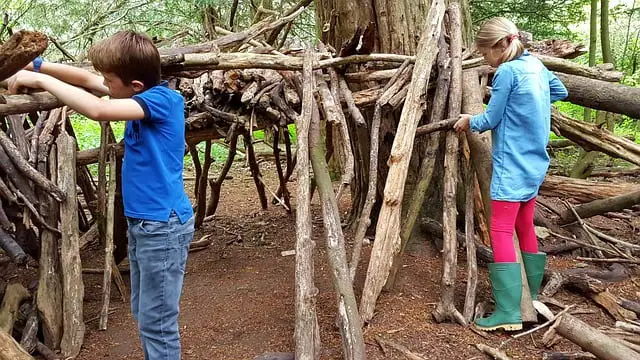The Hidden Benefits of Everyday Activities for Children’s Education
Can we use everyday activities in an educational way in our homeschool? As parents, we want to provide our children with the best education possible. However, there is more to educating our children than just sitting down to do book work. Everyday activities can provide valuable educational benefits for children. By incorporating educational activities into our daily routines, we can help children become lifelong learners and develop a love for learning.
Home Education With Everyday Activities
As parents we often worry when we are contacted by authorities to report on our children’s home education. What can we include and what should we leave out and what can we include that is educational. This article will explore the hidden benefits of everyday activities for children’s education and provide tips on how to harness them in educational settings.
Everyday Educational Activities for Kids
These are some everyday activities with details of how you can show that they are educational for your kids.
Cooking and Baking Activity
Cooking and baking are activities that can provide a wealth of educational activity opportunities for children. Not only can they learn about nutrition and healthy eating, but they can also develop various academic and life skills. Here are some of the ways that cooking and baking can be educational:
Maths: Cooking and baking require precise measurement of ingredients, which can help children learn about fractions, units of measurement, and basic arithmetic. They can also develop their spatial awareness and fine motor skills by pouring, scooping, and measuring ingredients.
Nutrition: Cooking and baking can provide children with a better understanding of nutrition and healthy eating habits. By exploring the benefits of various ingredients, techniques, recipes and how they contribute to a balanced diet, children can learn to make healthier choices and develop a positive relationship with food.. This can also help them to develop preferences and aversions for certain foods. Include the nutritional aspects of a recipe under science.
Cultural awareness: Cooking and baking can expose children to different cultures and cuisines, helping them learn about the world and its diverse traditions. They can learn to appreciate and respect different foods and cultures. For example when you are learning about a country in Geography incorporate a national dish to make from the country with your children.
Science: Cooking and baking involve various chemical reactions and transformations, such as mixing, heating, and cooling ingredients. Children can learn about basic chemistry principles, such as the role of heat and acids in cooking, and how to observe and record changes in ingredients.
Creativity: Cooking and baking provide children with opportunities to experiment with different flavors, ingredients, and techniques. They can learn to follow recipes and adapt them to their tastes, developing their creativity and imagination.

Gardening
Gardening is an excellent activity for children as it provides hands-on learning experiences that can be both educational and enjoyable.
Science: Gardening can be an excellent way to teach children about science. They can learn about plant biology and the life cycle of plants. They can observe how seeds germinate and grow, and how different environmental factors, such as water, soil and sunlight, affect plant growth.
Math: Gardening can also be used to teach children about math. They can measure the dimensions of the garden bed, calculate the amount of soil or fertilizer needed, and estimate how much water to give the plants.
Sustainability: Gardening can help children learn about sustainability and the importance of conserving natural resources. They can learn about composting and recycling, and how to reduce waste by reusing materials.
Responsibility: Gardening can help teach children about responsibility. They can learn to care for the plants by watering them, weeding the garden bed, and ensuring that they get the proper amount of sunlight. You can also teach your children about the consequences of neglecting plants and the importance of taking care of living things.
Nutrition: Gardening can also teach children about nutrition and healthy eating habits. Get your children to learn about different types of vegetables and fruits, and how to prepare healthy meals with the produce they grow.
Budgeting
Budgeting is an essential life skill that can help individuals of all ages manage their finances effectively. Here are some of the ways that budgeting can be educational:
Math: Budgeting involves calculations and mathematical skills, such as addition, subtraction, multiplication, and division. By creating a budget, children can improve their math skills and learn how to manage money effectively.
Planning and organization: Budgeting requires planning and organization skills. Children can learn how to prioritize their spending, set financial goals, and make informed decisions about their finances.
Responsibility: Budgeting can help teach children about responsibility. They can learn to manage their own money, pay bills on time, and understand the consequences of overspending.
Financial literacy: Budgeting can help teach children about financial literacy, such as understanding the value of money, the importance of saving, and the consequences of debt.
Goal-setting: Budgeting can help children learn how to set financial goals and work towards achieving them. They can learn about the rewards of saving money and making smart financial decisions.
Problem-solving: Budgeting can help children develop problem-solving skills. They can learn how to identify financial problems and come up with solutions to overcome them.
Budgeting is an essential life skill that can provide many educational benefits for children. By teaching children how to manage their money effectively, we can help them develop math, planning, organization, responsibility, financial literacy, goal-setting, and problem-solving skills that will benefit them throughout their lives. Moreover, budgeting can be a fun and interactive activity that can help children learn the value of money and the importance of making informed financial decisions.
Den Building
Den building is a fun and creative activity that can be enjoyed by children of all ages.
STEM skills: Den building can help children develop STEM skills such as engineering, physics, and geometry. They can learn about the different materials needed to build a sturdy and stable structure and understand how to use these materials to construct a den.
Problem-solving: Den building can help children develop problem-solving skills. They can learn to identify potential obstacles and find creative solutions to overcome them.
Creativity: Den building can help children develop their creativity by encouraging them to use their imagination and come up with unique designs and structures.
Collaboration: Den building can be a great way to promote collaboration and teamwork. Children can work together to plan and build their den, sharing ideas and working towards a common goal.
Spatial awareness: Den building can help children develop spatial awareness, as they learn to understand the relationship between objects and space.
Outdoor education: Den building is an outdoor activity that can help children connect with nature and learn about the environment. Children can learn about the natural materials they can use to build their dens, as well as the different plants and animals that live in their surroundings.

Den building is a fun and educational activity that can help children develop a range of skills, including STEM skills, problem-solving, creativity, collaboration, spatial awareness, and outdoor education. By encouraging children to build dens, we can help them develop important life skills that will benefit them in the future, while also fostering a love for the outdoors and a connection with nature. Moreover, den building can be a great way to spend quality time with family and friends while learning and having fun.
Board Games
Playing board games is a popular pastime for people of all ages, and it can also be an excellent educational activity for children.
Critical thinking: Many board games require players to think critically and strategically to achieve their objectives. By playing these games, children can develop critical thinking and problem-solving skills that can be applied to various areas of their lives.
Reading and vocabulary: Many board games require players to read instructions, cards, and other game elements. By playing these games, children can improve their reading skills and expand their vocabulary.
Social skills: Board games are a great way to develop social skills, such as teamwork, communication, and sportsmanship. By playing with others, children can learn how to interact with others, resolve conflicts, and follow rules.
History and culture:: Some board games are based on historical events or cultural traditions. By playing these games, children can learn about different cultures and time periods in a fun and interactive way.
Creativity:: Some board games require players to be creative and imaginative. By playing these games, children can develop their creativity and problem-solving skills by coming up with unique solutions to challenges presented in the game.
Why Everyday Educational Activities are Beneficial
Everyday activities offer a wealth of educational benefits for children, and can be an enjoyable way to learn and develop new skills.. By incorporating these everyday activities into our children’s lives, we can help them develop essential life skills, while also fostering a love for learning and a curiosity about the world around them.
This should give you some ideas as parents how we can incorporate everyday activities in our children’s education and how we can show the educational benefits when writing reports for authorities. Moreover, these activities can provide opportunities for parents and children to bond and spend quality time together, creating cherished memories that will last a lifetime.

